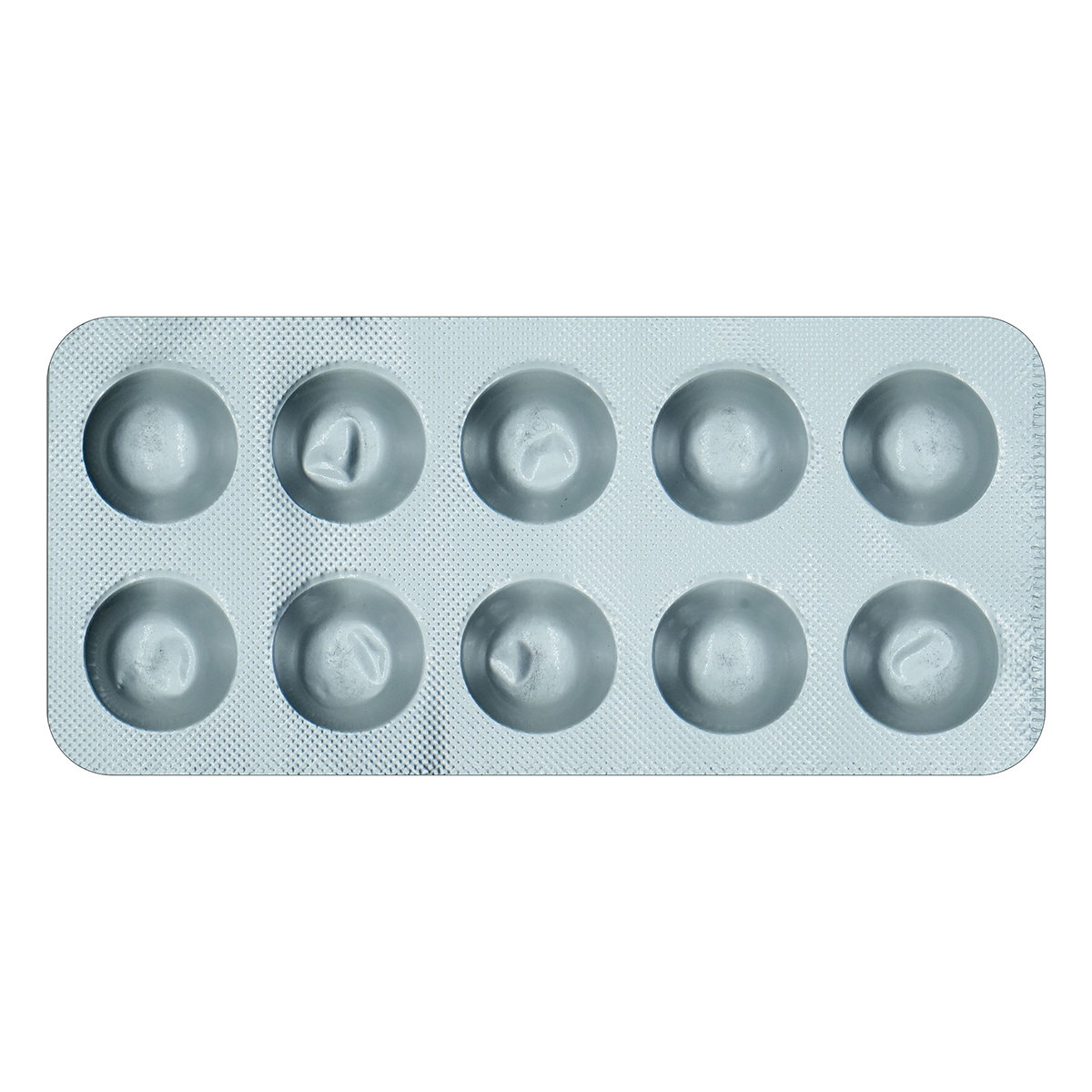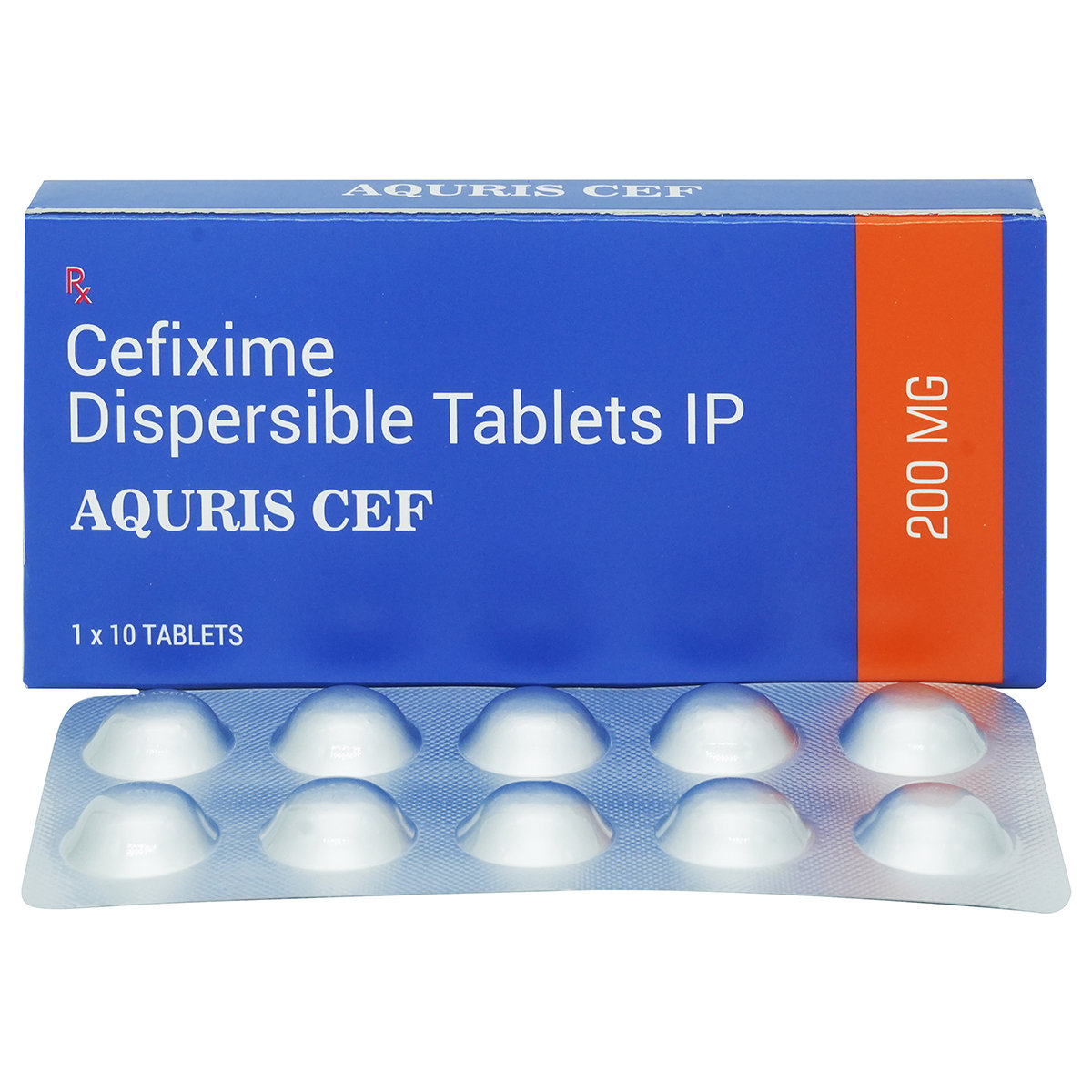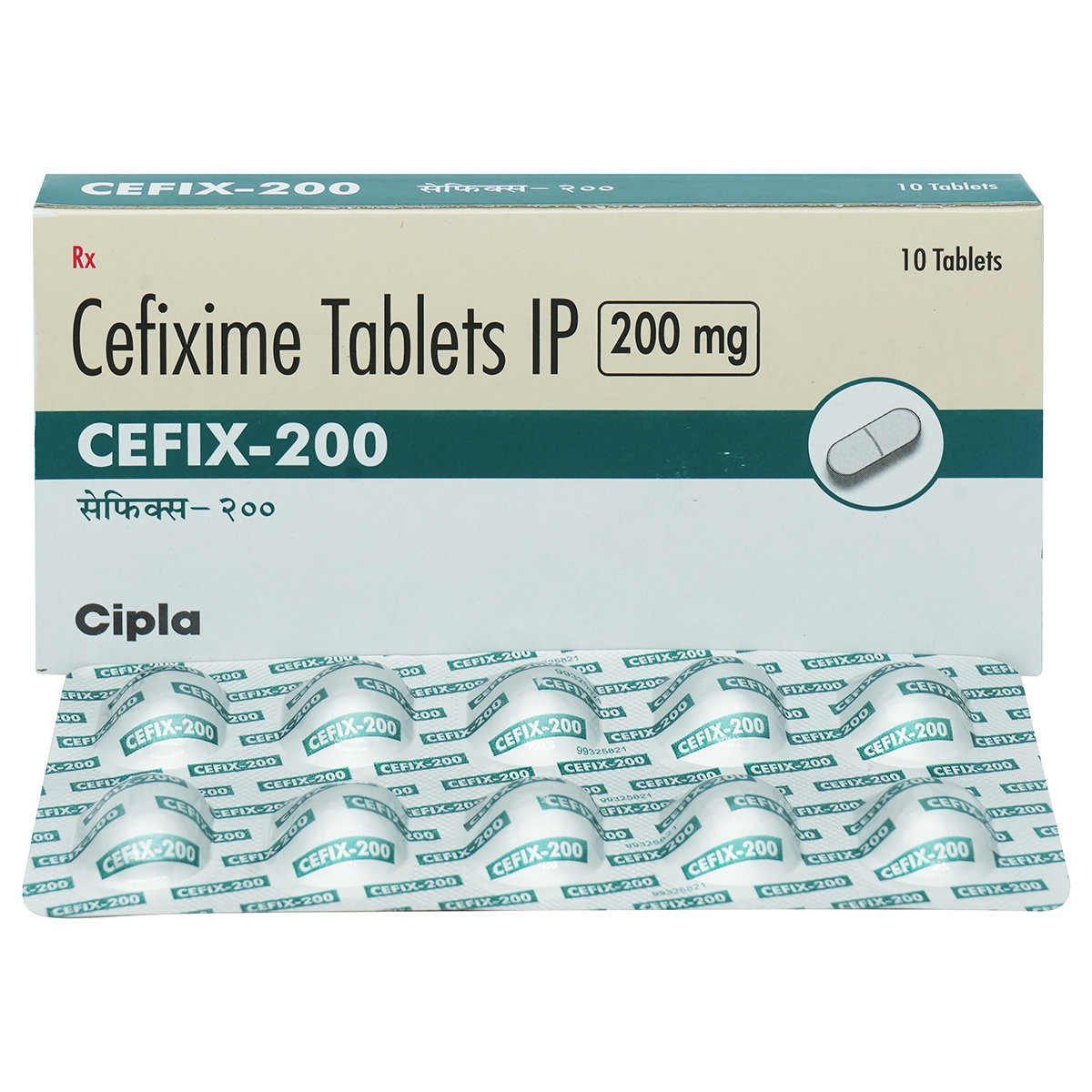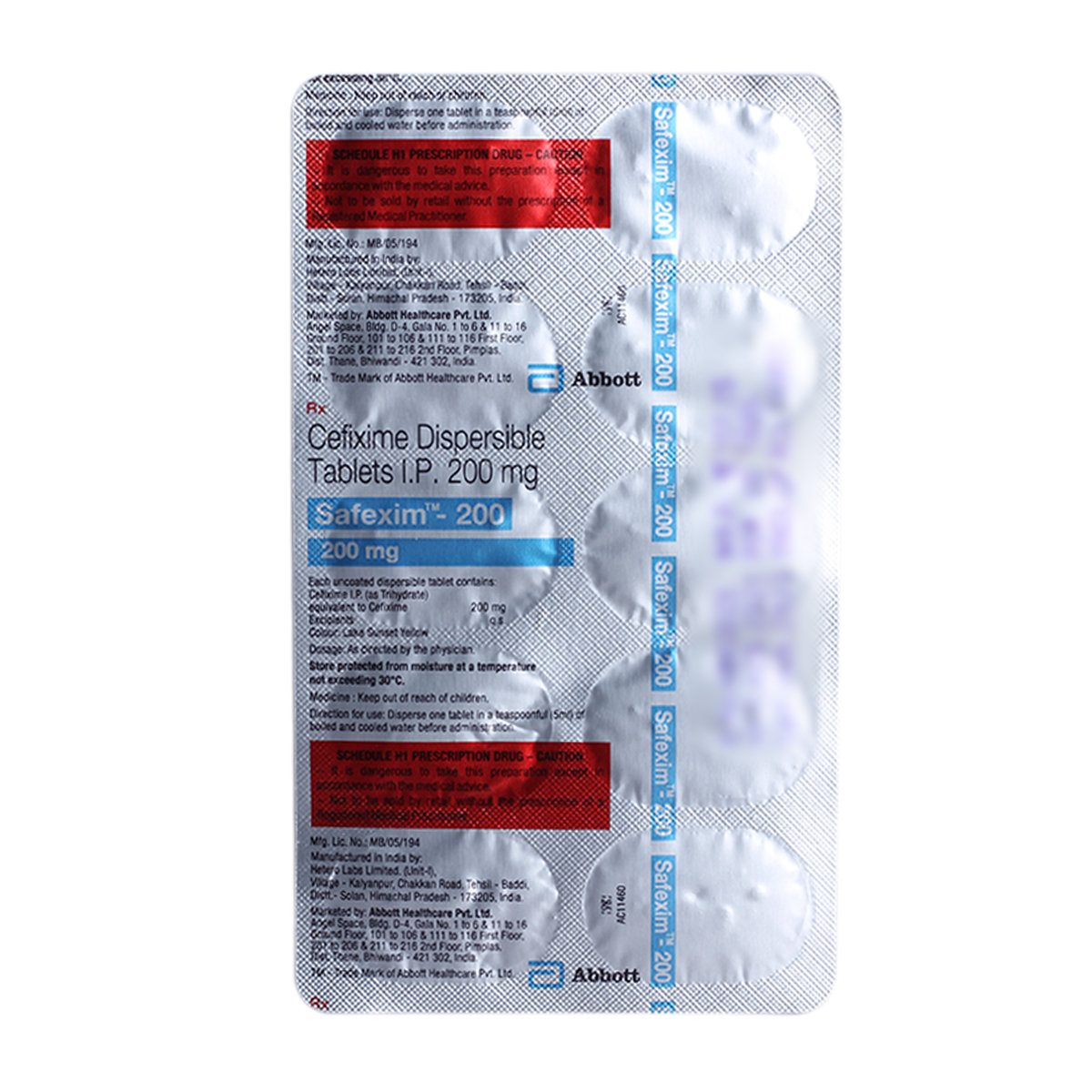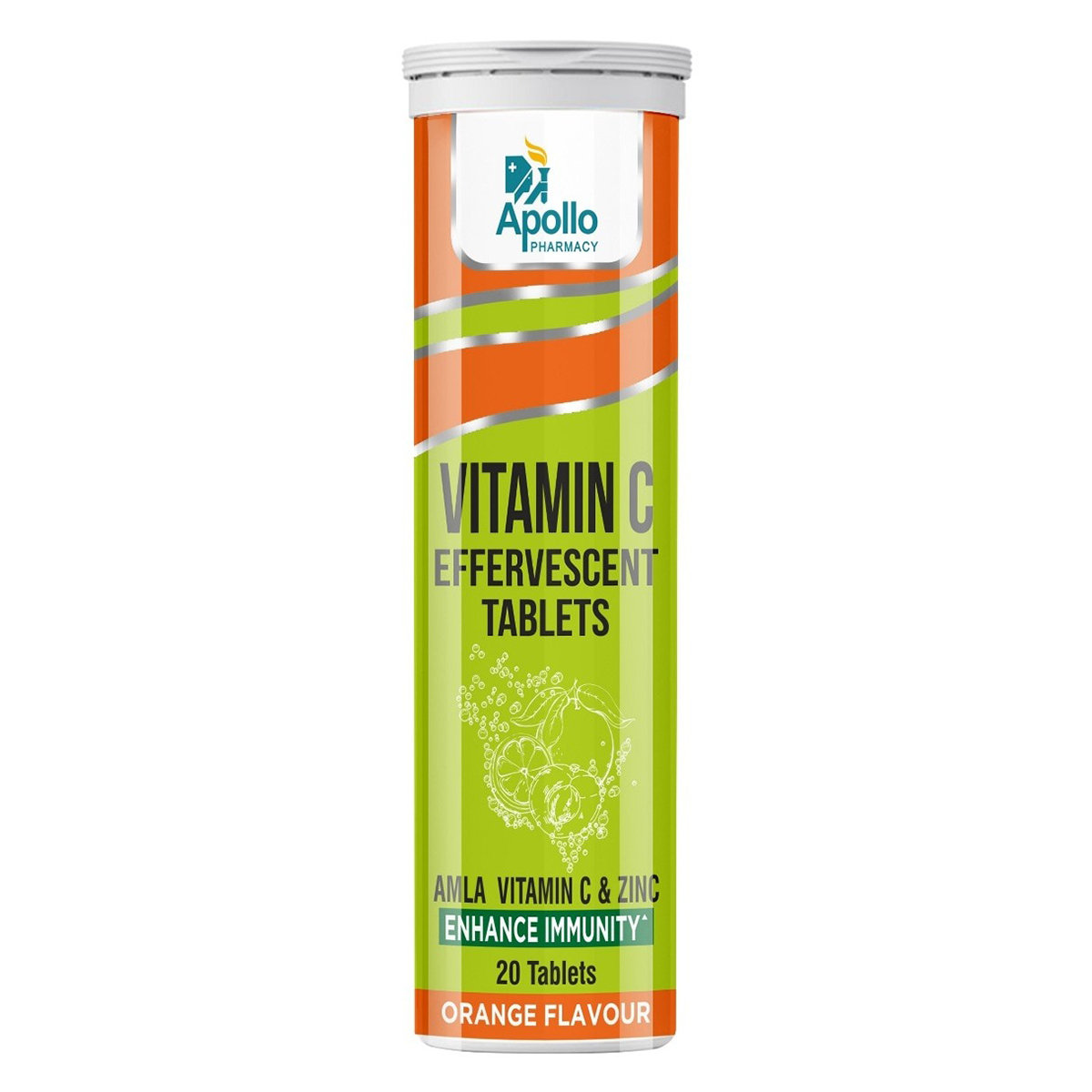Cefilab 200 Tablet 10's
MRP ₹75.5
(Inclusive of all Taxes)
₹11.3 Cashback (15%)
Know Your Delivery Time
Provide Delivery Location

Secure Payment

India's Most Trusted Pharmacy

Genuine Products
Composition :
Manufacturer/Marketer :
Consume Type :
Expires on or after :
Return Policy :
NPPA :
About Cefilab 200 mg Tablet
Cefilab 200 mg Tablet is used to treat bacterial infections of the ear, nose, sinuses (sinusitis), throat (tonsillitis, pharyngitis), chest and lungs (bronchitis, pneumonia) and urinary system (cystitis and kidney infections).
Cefilab 200 mg Tablet contains Cefixime, which works by inhibiting bacterial cell wall synthesis. In turn, Cefilab 200 mg Tablet weakens and destroys the bacterial cell wall, leading to death. As a result, Cefilab 200 mg Tablet helps to treat bacterial infections.
Sometimes, you may experience side effects such as diarrhoea, nausea, loose stools, abdominal pain, dyspepsia, indigestion, and vomiting. Most of these side effects do not require medical attention and resolve gradually over time. However, talk to your doctor if you experience these side effects persistently.
Do not take Cefilab 200 mg Tablet if you are allergic to cefixime, other cephalosporin antibiotics, or any other ingredients of this medicine. If you are pregnant or breastfeeding, think you may be pregnant, or are planning to have a baby, ask your doctor for advice before taking Cefilab 200 mg Tablet .
Uses of Cefilab 200 mg Tablet
Cefilab 200 mg Tablet is used in the treatment of Bacterial Infections. The detailed uses of Cefilab 200 mg Tablet are as follows:
- Treatment of Bacterial Infections: Cefilab 200 mg Tablet is widely used to combat bacterial infections such as respiratory tract infections and urinary tract infections. It functions by inhibiting bacterial growth, aiding recovery.
- Management of Otitis Media: Cefilab 200 mg Tablet may be prescribed for otitis media, a middle ear infection common in children, to alleviate pain and discomfort associated with the condition.
- Treatment of Sinusitis: Cefilab 200 mg Tablet proves effective in treating sinusitis, which involves inflammation of the sinus cavities caused by bacterial infections. It helps relieve symptoms such as nasal congestion and pressure.
- Gonorrhea Treatment: Sometimes, Cefilab 200 mg Tablet is used to treat gonorrhea, a sexually transmitted infection caused by the Neisseria gonorrhoeae bacteria. This use is usually a part of a dual therapy approach.

Have a query?
Directions for Use
- Cefilab 200 mg Tablet can be taken with or without food or as advised by your doctor.
- Follow your doctor's instructions on the dosage and timing of this medication.
- Swallow Cefilab 200 mg Tablet as a whole with a glass of water.
- Do not crush, break, or chew it.
Key Benefits
- Cefilab 200 mg Tablet is used to treat a wide range of bacterial infections.
- It prevents the growth of bacteria by stopping the formation of a protective covering, which is vital for its growth.
- It prevents and treats bacterial infections like ear, nose, sinuses (sinusitis), throat (tonsillitis, pharyngitis), chest and lungs (bronchitis, pneumonia) and urinary system (cystitis and kidney infections).
- Additionally, it is also prescribed to treat uncomplicated gonorrhea (cervical/urethral).
How Cefilab 200 mg Tablet Works
Storage
- Preventing Vomiting (Before it Happens)
- Take medication exactly as prescribed by your doctor. This can help minimize side effects, including vomiting.
- Having a small meal before taking your medication can help reduce nausea and vomiting.
- Talk to your doctor about taking anti-nausea medication along with your prescribed medication.
- Managing Vomiting (If it Happens)
- Try taking ginger in the form of tea, ale, or candy to help alleviate nausea and vomiting.
- What to Do if Vomiting Persists
- Consult your doctor if vomiting continues or worsens, consult the doctor for guidance on adjusting your medication or additional treatment.
- Inform Your Doctor: Notify your doctor immediately about your diarrhoea symptoms. This allows them to adjust your medication or provide guidance on managing side effects.
- Stay Hydrated: Drink plenty of fluids to replace lost water and electrolytes. Choose water, clear broth, and electrolyte-rich drinks. Avoid carbonated or caffeinated beverages to effectively rehydrate your body.
- Follow a Bland Diet: Eat easy-to-digest foods to help firm up your stool and settle your stomach. Try incorporating bananas, rice, applesauce, toast, plain crackers, and boiled vegetables into your diet.
- Avoid Trigger Foods: Steer clear of foods that can worsen diarrhoea, such as spicy, fatty, or greasy foods, high-fibre foods, and dairy products (especially if you're lactose intolerant).
- Practice Good Hygiene: Maintain good hygiene to prevent the spread of infection. To stay healthy, wash your hands frequently, clean and disinfect surfaces regularly, and avoid exchanging personal belongings with others.
- Take Anti-Diarrheal Medications: If your doctor advises, anti-diarrheal medications such as loperamide might help manage diarrhoea symptoms. Always follow your doctor's directions.
- Keep track of your diarrhoea symptoms. If they don't get better or worse or are accompanied by severe stomach pain, blood, or dehydration signs (like extreme thirst or dark urine), seek medical help.
- Inform your doctor about the nausea and discuss possible alternatives to the medication or adjustments to the dosage.
- Divide your daily food intake into smaller, more frequent meals to reduce nausea.
- Opt for bland, easily digestible foods like crackers, toast, plain rice, bananas, and applesauce.
- Avoid certain foods that can trigger nausea, such as fatty, greasy, spicy, and smelly foods.
- Drink plenty of fluids, such as water, clear broth, or electrolyte-rich beverages like coconut water or sports drinks.
- Use ginger (tea, ale, or candies) to help relieve nausea.
- Get adequate rest and also avoid strenuous activities that can worsen nausea.
- Talk to your doctor about taking anti-nausea medication if your nausea is severe.
- Record when your nausea occurs, what triggers it, and what provides relief to help you identify patterns and manage your symptoms more effectively.
- Inform Your Doctor: Notify your doctor immediately about your diarrhoea symptoms. This allows them to adjust your medication or provide guidance on managing side effects.
- Stay Hydrated: Drink plenty of fluids to replace lost water and electrolytes. Choose water, clear broth, and electrolyte-rich drinks. Avoid carbonated or caffeinated beverages to effectively rehydrate your body.
- Follow a Bland Diet: Eat easy-to-digest foods to help firm up your stool and settle your stomach. Try incorporating bananas, rice, applesauce, toast, plain crackers, and boiled vegetables into your diet.
- Avoid Trigger Foods: Steer clear of foods that can worsen diarrhoea, such as spicy, fatty, or greasy foods, high-fibre foods, and dairy products (especially if you're lactose intolerant).
- Practice Good Hygiene: Maintain good hygiene to prevent the spread of infection. To stay healthy, wash your hands frequently, clean and disinfect surfaces regularly, and avoid exchanging personal belongings with others.
- Take Anti-Diarrheal Medications: If your doctor advises, anti-diarrheal medications such as loperamide might help manage diarrhoea symptoms. Always follow your doctor's directions.
- Keep track of your diarrhoea symptoms. If they don't get better or worse or are accompanied by severe stomach pain, blood, or dehydration signs (like extreme thirst or dark urine), seek medical help.
- Drink water or other clear fluids.
- To prevent worsening of pain, limit intake of tea, coffee, or alcohol.
- Include bland foods like rice, toast, crackers, and rice in your diet.
- Avoid lying down immediately after eating as it may cause indigestion or heartburn.
- Avoid acidic and spicy food as it may cause indigestion.
- Take medications with food (if recommended): It can help prevent stomach distress and indigestion.
- Eat smaller, more frequent meals: Divide daily food intake into smaller, more frequent meals to ease digestion.
- Avoid trigger foods: Identify and avoid foods that trigger indigestion, such as spicy, fatty, or acidic foods.
- Stay upright after eating: Sit or stand upright for at least 1-2 hours after eating to prevent stomach acid from flowing into the oesophagus.
- Avoid carbonated drinks: Avoid drinking carbonated beverages, such as soda or beer, which can worsen indigestion.
- Manage stress: To alleviate indigestion, engage in stress-reducing activities like deep breathing exercises or meditation.
- Consult a doctor if needed: If indigestion worsens or persists, consult a healthcare professional to adjust the medication regimen or explore alternative treatments.
What if I have taken an overdose of Cefilab 200 mg Tablet
Drug Warnings
- Do not take Cefilab 200 mg Tablet if you are allergic to Cefixime or other cephalosporin antibiotics, or any of the other ingredients of this medicine.
- Talk to the doctor before taking Cefilab 200 mg Tablet if you have seizures, liver or renal dysfunction, heart disorder, or inflammation of the colon's inner lining (colitis).
- Do not take Cefilab 200 mg Tablet without first consulting the doctor if you are pregnant, planning for pregnancy or breastfeeding.
- Drive only if you are alert, as Cefilab 200 mg Tablet may cause dizziness.
- Cefilab 200 mg Tablet may interact with certain tests, such as those for glucose (sugar) in urine, and yield unusual results. Therefore, inform the doctor that you are using Cefilab 200 mg Tablet before undergoing any tests.
- Do not take this medicine without consulting a healthcare professional, as self-medication may lead to antibiotic resistance, where antibiotics fail to act against specific bacterial infections.
Drug-Drug Interactions
Drug-Drug Interactions
Login/Sign Up
Co-administration of Cefilab 200 Tablet with Cholera vaccine may reduce the effectiveness of the vaccine.
How to manage the interaction:
Talk to your doctor before receiving the cholera vaccine if you are currently being treated with Cefilab 200 Tablet or have been treated within the last 14 days. To ensure adequate vaccine response, you should not receive cholera vaccine until at least 14 days after you complete your antibiotic therapy. Do not discontinue the medication without consulting a doctor.
Drug-Food Interactions
Drug-Food Interactions
Login/Sign Up
Diet & Lifestyle Advise
- After taking the full course of Cefilab 200 mg Tablet , probiotics should be taken to restore some of the healthy bacteria in the intestines that may have been killed. Taking probiotics after antibiotic treatment can reduce the risk of antibiotic-associated diarrhoea. Certain fermented foods, such as yoghurt, cheese, sauerkraut, kombucha, and kimchi, can help restore the intestine's good bacteria.
- Include more fibre-enriched food in your diet, as it can be easily digested by gut bacteria, which helps stimulate their growth. Thus, fibre foods may help restore healthy gut bacteria after a course of antibiotics. Whole grains, such as whole-grain bread and brown rice, should be included in your diet.
- Avoid consuming excessive amounts of calcium, as well as iron-enriched foods and drinks, as this may interfere with the functioning of Cefilab 200 mg Tablet .
- Avoid alcoholic beverages with Cefilab 200 mg Tablet as it can dehydrate and affect your sleep. This can make it harder for your body to aid the Cefilab 200 mg Tablet in fighting off infections.
Habit Forming
Therapeutic Class
All Substitutes & Brand Comparisons
- Apollo-Trusted
RX
Aquris Cef 200 mg Tablet 10's
Auspharma Pvt Ltd
₹102.5
(₹8.2 per unit)
20% COSTLIER - Apollo-Trusted
RX
Cefix-200 Tablet 10's
Cipla Ltd
₹102.5
(₹8.2 per unit)
20% COSTLIER - Apollo-Trusted
RX
Safexim 200 mg Tablet 10's
Abbott India Ltd
₹102.5
(₹8.2 per unit)
20% COSTLIER
Alcohol
Safe if prescribed
It is unknown whether Cefilab 200 mg Tablet interacts with alcohol. However, as a precautionary measure, it is advisable not to take or limit alcohol.
Pregnancy
Consult your doctor
Cefilab 200 mg Tablet should not be used during pregnancy unless clearly necessary. Your doctor will weigh the benefits and potential risks before prescribing it. Please consult your doctor.
Breast Feeding
Consult your doctor
Cefilab 200 mg Tablet should be administered to nursing mothers only if the benefits of therapy are judged to outweigh the potential risks to the infant. Hence, it is best to consult a doctor before taking Cefilab 200 mg Tablet .
Driving
Safe if prescribed
Caution should be exercised; Cefilab 200 mg Tablet usually causes drowsiness and confusion, affecting driving ability.
Liver
Consult your doctor
Cefilab 200 mg Tablet to be taken with caution, especially if you have a history of liver diseases/conditions. The dose may have to be adjusted by your doctor.
Kidney
Consult your doctor
Cefilab 200 mg Tablet to be taken with caution, especially if you have a history of Kidney diseases/conditions. The dose may have to be adjusted by your doctor.
Children
Safe if prescribed
Cefilab 200 mg Tablet to be taken with caution, especially if you are children below 12. Your doctor may adjust your dose depending on your age.
Heart
Please consult your doctor before using Cefilab 200 mg Tablet if you have pre-existing heart problems. Your doctor will prescribe Cefilab 200 mg Tablet if the benefits outweigh the risks.
Geriatrics
Consult your doctor
Please consult a doctor before administering Cefilab 200 mg Tablet to geriatric patients. Your doctor will prescribe Cefilab 200 mg Tablet if the benefits outweigh the risks.
FAQs
Cefilab 200 mg Tablet is used to treat bacterial infections of the ear, nose, sinuses, throat, chest, lungs and urinary system. Additionally, it is also used to treat uncomplicated gonorrhea (cervical/urethral).
Cefilab 200 mg Tablet comprises Cefixime. The bactericidal action of Cefixime is due to the inhibition of cell wall synthesis. In turn, Cefilab 200 mg Tablet weakens and destroys the bacterial cell wall, ultimately leading to the cell's death. As a result, Cefilab 200 mg Tablet helps to treat bacterial infections.
Cefilab 200 mg Tablet can cause diarrhoea, which may be a sign of a new infection. If you have watery or bloody diarrhoea, call your doctor. Do not use anti-diarrhoea medicine unless your doctor tells you to.
If you forget to take Cefilab 200 mg Tablet , take your dose as soon as possible. If it is almost time for the next dose, just skip that dose and take the next one when it is due. If in doubt, please contact your doctor. Do not take a double dose to make up for a forgotten dose.
Yes, treating urinary tract infection (UTI) by Cefilab 200 mg Tablet may be a good alternative. However, it should be taken under the supervision of a healthcare professional.
Cefilab 200 mg Tablet is active against a very wide spectrum of bacteria such as Staphylococcus aureus, Streptococcus pneumoniae, Streptococcus pyogenes (the cause of strep throat), Hemophilus influenzae, Moraxella catarrhalis, E. coli, Klebsiella, Proteus mirabilis, Salmonella, Shigella, and Neisseria gonorrhoeae.
No, it does not treat colds, flu, or other viral infections. It is intended for use only in specific bacterial infections.
Cefilab 200 mg Tablet was effective in treating bacterial sinus infections in adults and was well tolerated.
No, it is a prescribed drug given by a physician to prevent specific medical conditions. Taking it on your own can cause unwanted side effects.
Cefilab 200 mg Tablet may alter certain laboratory test results, like glucose (sugar) in the urine. Inform your doctor before undergoing the above test.
Talk to the doctor before taking Cefilab 200 mg Tablet if you have seizures, liver or renal dysfunction, heart disorder, and inflammation of the colon's inner lining (colitis). Do not take Cefilab 200 mg Tablet without first consulting the doctor if you are pregnant, planning for pregnancy or breastfeeding.
Yes, Cefilab 200 mg Tablet is safe and effective if taken in the dose and duration prescribed by the doctor.
Cefilab 200 mg Tablet should be taken for as long as it has been prescribed by the doctor. The doctor will determine the duration of the treatment based on your condition.
Consult a doctor if you do not experience improvement after using Cefilab 200 mg Tablet for the prescribed duration.
If you miss a dose of Cefilab 200 mg Tablet , take it as soon as you remember. However, if it is almost time for the scheduled dose, skip the missed dose and take the next dose at the scheduled time.
Cefilab 200 mg Tablet to be taken with caution, especially if you have a history of kidney diseases/conditions. The dose may have to be adjusted by your doctor.
Cefilab 200 mg Tablet can be taken with or without food.
Sometimes, Cefilab 200 mg Tablet may cause side effects such as diarrhea, nausea, loose stools, abdominal pain, dyspepsia, indigestion, and vomiting. Most of these side effects do not require medical attention and resolve gradually over time. However, you are advised to talk to your doctor if you experience these side effects persistently.
Do not discontinue Cefilab 200 mg Tablet without consulting your doctor. To treat your condition effectively, keep taking Cefilab 200 mg Tablet for the prescribed duration.
Country of origin
Manufacturer/Marketer address
Disclaimer
Author Details
We provide you with authentic, trustworthy and relevant information


